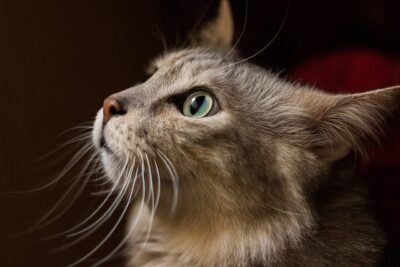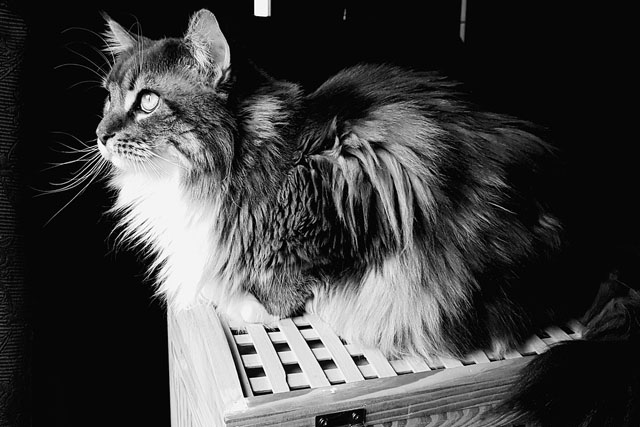



One of the most effective ways to reduce shedding in cats is by regularly brushing their fur. Brushing helps to remove loose hair and prevents it from ending up all over your furniture and clothes. It also helps to distribute the natural oils in your cat's fur, keeping it healthy and reducing shedding. Make sure to use a brush that is suitable for your cat's coat type, such as a slicker brush for long-haired cats or a rubber brush for short-haired cats. Brush your cat at least once a week, or more frequently during shedding seasons.
A balanced and nutritious diet plays a crucial role in maintaining your cat's overall health, including the condition of their coat. Feeding your cat a high-quality cat food that is rich in essential nutrients, such as omega-3 fatty acids, can help to reduce excessive shedding. Omega-3 fatty acids are known to promote healthy skin and coat, reducing dryness and excessive shedding. Consult with your veterinarian to determine the best diet for your cat's specific needs.
In addition to a high-quality diet, certain supplements can also help to reduce shedding in cats. Omega-3 fatty acid supplements, such as fish oil, can be added to your cat's food to promote a healthy coat. Other supplements, such as biotin or zinc, may also be beneficial in reducing shedding. However, it is important to consult with your veterinarian before adding any supplements to your cat's diet to ensure they are safe and appropriate for your cat.
Proper hydration is essential for maintaining a healthy coat and reducing shedding in cats. Make sure your cat always has access to fresh and clean water. If your cat is not drinking enough water, consider providing a water fountain or adding wet food to their diet to increase their water intake. Proper hydration helps to keep your cat's skin and coat moisturized, reducing dryness and excessive shedding.
In addition to regular brushing, proper grooming techniques can also help to reduce shedding in cats. This includes trimming your cat's nails regularly to prevent them from scratching and damaging their skin, which can lead to excessive shedding. It is also important to clean your cat's ears and teeth regularly to prevent any infections or dental issues that can contribute to shedding. Additionally, keeping your cat's bedding and living areas clean can help to reduce allergens and shedding.
Fleas and parasites can cause excessive itching and scratching in cats, leading to hair loss and shedding. It is important to regularly check your cat for fleas and ticks and use appropriate flea control products to prevent infestations. Consult with your veterinarian to determine the best flea control method for your cat. Additionally, make sure your cat is up to date on their parasite prevention medications, such as deworming treatments, to prevent any internal parasites that can also contribute to shedding.
Stress can have a negative impact on your cat's overall health, including their coat condition and shedding. Cats are sensitive animals and can easily become stressed by changes in their environment or routine. To reduce stress and minimize shedding, provide your cat with a calm and stable environment. This includes providing them with a quiet and comfortable space, plenty of toys and mental stimulation, and maintaining a consistent daily routine. If your cat is prone to stress or anxiety, consult with your veterinarian for additional strategies to help manage their stress levels.
Regular veterinary check-ups are essential for maintaining your cat's overall health and can help to identify any underlying medical conditions that may be contributing to excessive shedding. Your veterinarian can perform a thorough examination, including checking for any skin issues, allergies, or hormonal imbalances that can cause shedding. They can also provide guidance on the best grooming practices and recommend any necessary treatments or medications to reduce shedding.
There are various specialized shedding tools available that can help to reduce shedding in cats. These tools are designed to remove loose hair from your cat's coat without causing any discomfort. Examples include deshedding brushes, grooming gloves, and shedding combs. These tools can be particularly useful for cats with thick or long hair. However, it is important to use these tools with caution and follow the instructions provided to avoid causing any harm to your cat's skin or coat.
If you find that despite your best efforts, your cat's shedding is still excessive, you may want to consider professional grooming services. Professional groomers have the expertise and specialized tools to effectively remove excess hair and keep your cat's coat in optimal condition. They can also provide additional services such as bathing, nail trimming, and ear cleaning. However, it is important to choose a reputable and experienced groomer who is knowledgeable about cat grooming techniques and practices.
By implementing these tricks to prevent your cat from shedding a lot of hair, you can help to reduce excessive shedding and keep your cat's coat healthy and beautiful. Remember to be patient and consistent with your grooming routine, and consult with your veterinarian if you have any concerns about your cat's shedding or overall health.
Leave a Reply
Related posts